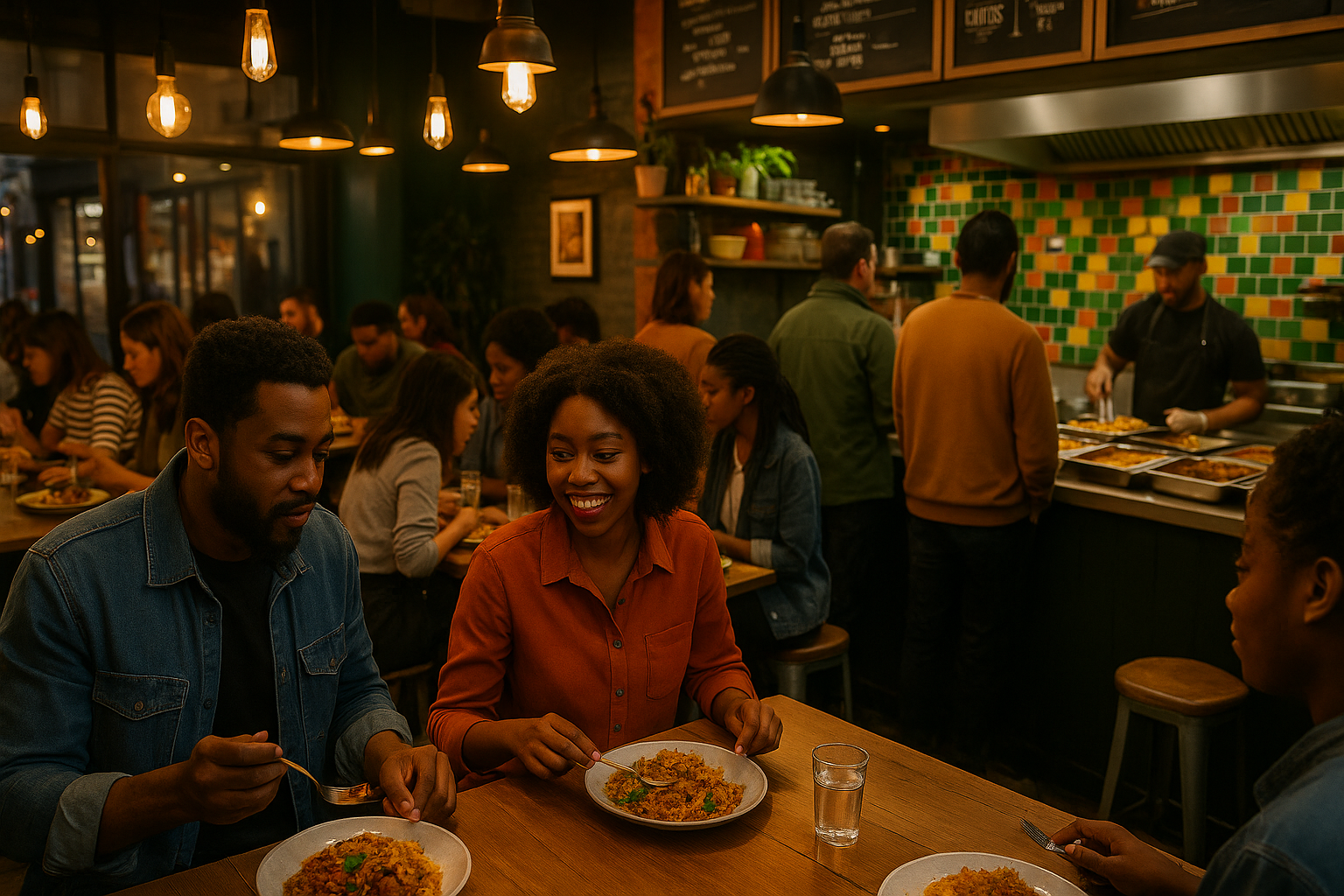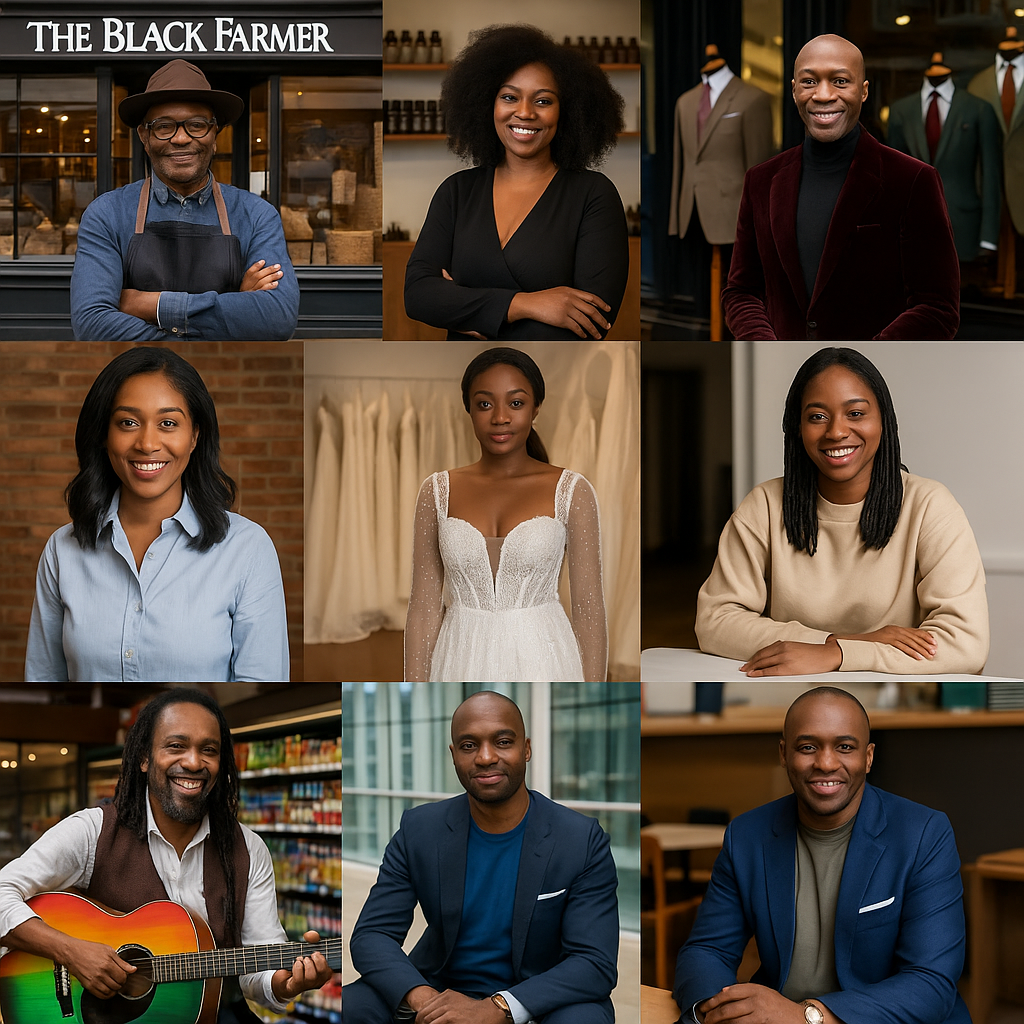Where to Find Black-Owned Restaurants, Cafés, and Street Food in the UK
Across the United Kingdom, Black‑owned eateries—from lively street‑food carts to serene cafés and fine dining restaurants—are not just serving great food but reshaping British culture one dish at a time. These establishments—scattered along Electric Avenue in Brixton, through Peckham Village, across Hackney, up to Edinburgh’s historic Royal Mile—have become local landmarks. Whether it’s the coffee-scented lounges of Saint Aymes in central London or the Michelin‑starred splendor of Chishuru in Fitzrovia, they attract diners of all backgrounds and cultivate shared experience and understanding. Black‑owned food businesses act as portals; they celebrate identity, diversity, and creativity through taste and warmth, reaffirming that inclusive culinary scenes help knit society together.

Caribbean Comfort on Brixton’s Electric Avenue
Few places reflect cultural fusion like Brixton Market and its Electric Avenue, where Black‑owned vendors dominate the vibrant storefronts. There, Caribbean spot Fishbowl serves seafood boils with spice-drenched lobster and crisp cocktails in a joyful canopied space. Close by, sellers offer jerk chicken, fried red bream, and bread pudding—comfort foods that embody London’s multicultural soul, as noted by DesignMyNight’s food guide emphasizing the “soul of Black Britain” there. At Brixton Village, Chishuru got its start as a pop‑up in 2020 and now holds a Michelin star for West African tasting menus in Fitzrovia—but its roots remain firmly in that community. Brixton’s street-food scene offers not just flavours but stories of resilience and belonging.
Bokit’La and Jollof on the Capital’s Crossroads
On London’s markets and street festivals, food names like Bokit’La, Jollof Mama, and RapChar have become synonymous with heritage. Bokit’La, a Guadeloupean fry‑bread sandwich stall run by brothers Nico and Thierry, first gained attention at Oval Farmers Market and Alexandra Palace. Known for its fluffy bokit filled with saltfish or plantain and custom spice levels, it embodies French‑Caribbean pride and local ingenuity. Jollof Mama—a Nigerian duo in Covent Garden—transforms classic jollof rice into burritos wrapped with seared steak, delighting tourists and locals alike. These stalls enrich British food culture by offering dishes profound in heritage and addictive in flavour, proving that simple food can generate deep cultural resonance.
Elegant Treats at Saint Aymes Café
For those seeking whimsical indulgence, Saint Aymes café on Connaught Street brings a slice of pastel‑and‑gold luxury to the everyday cup of tea. Sisters Lois and Michela Wilson founded the café in 2016 with the mission to “make every day beautiful with chocolates,” offering 24‑carat gold‑smothered hot chocolates and cakes that look—and taste—like a dream. As the Express noted, “Nothing beats a local brick‑and‑mortar presence, especially if it can be immortalized on Instagram”. The café’s Instagram-ready aesthetic appeals to all generations and backgrounds, showcasing how Black‑owned cafés can shape mainstream lifestyle trends and elevate the simple pleasure of indulgent treats.
Chishuru and the Rise of West African Fine Dining
Chishuru started humbly as a pop‑up in Brixton Village in 2020, helmed by Nigerian-born chef Adejoké “Joké” Bakare. It quickly earned fame with supper clubs and rave reviews, culminating in a move to Fitzrovia and receiving a Michelin star in 2024—making her the first Black woman in the UK to achieve that milestone. The Guardian noted that “West African eateries with Michelin stars… ‘We won’t be ignored’”. Bakare’s dishes use fermented rice cakes, egusi ice cream, and spiced okra, combining ancestral ingredients and meticulous technique. For British diners, Chishuru offers more than a meal—it’s an education in taste, texture, and heritage, one that inspires young chefs and broadens culinary boundaries.
Hidden Gems in Hackney and Clapton
Beyond central London, East London is home to some of the most spontaneous and flavourful food scenes. Kaoshi Ghana Kitchen in Hackney brings contemporary Ghanaian cuisine into casual pop‑ups and supper events, while Andu Café in Dalston offers BYOB vegan Ethiopian staples such as spiced lentil stews and veggie platters, attracting a conscious and eclectic crowd. In Clapton, Little Baobab offers Senegalese soul food—a laid‑back environment with live music and community spirit. These businesses rely less on formal structures and more on word‑of‑mouth, cultivating inclusive communal spaces where food becomes a connective force and intro to different African culinary worlds.
Cornwall, Brighton and Beyond
Black‑owned culinary excellence isn’t confined to London. In Brighton, Momma Cherri’s Soul Food Shack has become a local staple, offering classics like catfish and collard greens in a welcoming seaside setting. Across the UK, Uber’s feature spotlighted restaurants north to south, showcasing how Black entrepreneurs are making their mark in Leeds, Glasgow, and Manchester. Meanwhile, Light of Africa in Brixton Village offers vegan Ethiopian plates and acts as a cultural beacon. These destinations highlight how Black‑owned food ventures are spreading root-like networks across towns and cities, infusing regional food scenes with authenticity and local color.
The Cultural Currency of Food and Identity
Food is more than flavour—it’s a medium for storytelling. African and Caribbean cultures often repeat proverbs like “food is the key to the heart” and the Swahili saying “Chakula ni dawa” meaning “food is medicine.” At Chishuru, Bakare told Business Insider, “cook from your heart and believe in yourself” . Jackson McLarty, founder of Black Eats LDN, said, “I want people to think, ‘I can’t wait to come back and have this’” when consumers try authentic Jamaican food. These sentiments echo across cuisines: Bokit’La brings Guadeloupean warmth to London markets, and Saint Aymes offers beauty in every bite—evidence that Black culinary enterprises are influencing how Britain sees food as culture, comfort, and celebration.
Building the Future of Inclusive Food Culture
Black‑owned restaurants, cafés, and street food in the UK are doing more than feeding people; they are teaching, bridging communities, and changing cultural norms. Michelin recognition, glowing media coverage from Time Out, The Guardian, CN Traveller, and business features in Business Insider signal legitimacy and celebration. These businesses mentor rising chefs and entrepreneurs, creating mentorship networks woven into the culinary fabric. By offering apprenticeships, pop‑up training, and open‑kitchen sessions, they uplift aspiring talent from minority backgrounds. Their presence enriches British dining—making retail districts more diverse, marketplaces more vibrant, and public life more inclusive. When diners choose these establishments, they help sustain community economies and propagate cultural literacy.
A Cultural Table for All
From Electric Avenue to Edinburgh’s cobbled Royal Mile, Britain’s Black‑owned food scene is a weaving of tradition, creativity, and hospitality that belongs to us all. Whether it’s the bold spices of a Jollof Mama burrito or the delicate elegance of Chishuru’s tasting menu, these dishes tell global stories rooted in local love. They remind us that food is one of the most democratic art forms—capable of bridging class, race, and geography. The shared joy in these flavours helps normalize inclusion at every table. And as more Britons champion these ventures—by eating, sharing, and celebrating their owners’ journeys—we cultivate an authentically diverse and delicious future.
Where to find Black‑owned restaurants, cafés, and street food in the UK? Look everywhere—market stalls, neighbourhood arcades, high streets, and upscale districts. These businesses are more than places to eat; they’re cultural salons, creative labs, and entrepreneurial incubators. Their impact extends beyond taste buds—it touches hearts, builds bridges, and challenges the status quo. To support them is to support story, identity, economy, mentorship, and belonging across Britain. Together, we’re not just appreciating new flavours, we’re helping reimagine what British cuisine can be. Take a seat. The table is rich, and there’s always room for one more.


